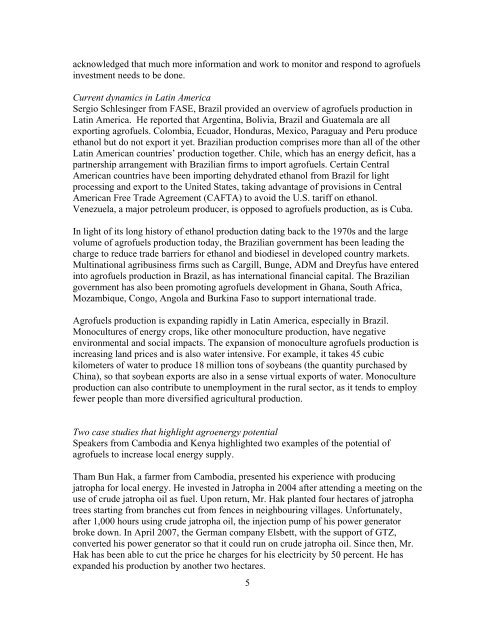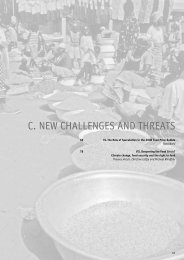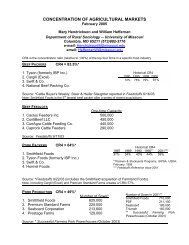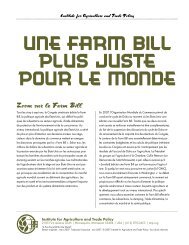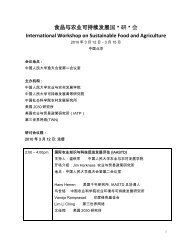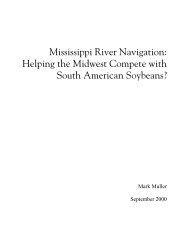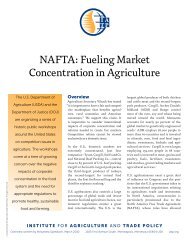Agrofuels: Opportunity or Danger? - Institute for Agriculture and ...
Agrofuels: Opportunity or Danger? - Institute for Agriculture and ...
Agrofuels: Opportunity or Danger? - Institute for Agriculture and ...
You also want an ePaper? Increase the reach of your titles
YUMPU automatically turns print PDFs into web optimized ePapers that Google loves.
acknowledged that much m<strong>or</strong>e inf<strong>or</strong>mation <strong>and</strong> w<strong>or</strong>k to monit<strong>or</strong> <strong>and</strong> respond to agrofuels<br />
investment needs to be done.<br />
Current dynamics in Latin America<br />
Sergio Schlesinger from FASE, Brazil provided an overview of agrofuels production in<br />
Latin America. He rep<strong>or</strong>ted that Argentina, Bolivia, Brazil <strong>and</strong> Guatemala are all<br />
exp<strong>or</strong>ting agrofuels. Colombia, Ecuad<strong>or</strong>, Honduras, Mexico, Paraguay <strong>and</strong> Peru produce<br />
ethanol but do not exp<strong>or</strong>t it yet. Brazilian production comprises m<strong>or</strong>e than all of the other<br />
Latin American countries’ production together. Chile, which has an energy deficit, has a<br />
partnership arrangement with Brazilian firms to imp<strong>or</strong>t agrofuels. Certain Central<br />
American countries have been imp<strong>or</strong>ting dehydrated ethanol from Brazil f<strong>or</strong> light<br />
processing <strong>and</strong> exp<strong>or</strong>t to the United States, taking advantage of provisions in Central<br />
American Free Trade Agreement (CAFTA) to avoid the U.S. tariff on ethanol.<br />
Venezuela, a maj<strong>or</strong> petroleum producer, is opposed to agrofuels production, as is Cuba.<br />
In light of its long hist<strong>or</strong>y of ethanol production dating back to the 1970s <strong>and</strong> the large<br />
volume of agrofuels production today, the Brazilian government has been leading the<br />
charge to reduce trade barriers f<strong>or</strong> ethanol <strong>and</strong> biodiesel in developed country markets.<br />
Multinational agribusiness firms such as Cargill, Bunge, ADM <strong>and</strong> Dreyfus have entered<br />
into agrofuels production in Brazil, as has international financial capital. The Brazilian<br />
government has also been promoting agrofuels development in Ghana, South Africa,<br />
Mozambique, Congo, Angola <strong>and</strong> Burkina Faso to supp<strong>or</strong>t international trade.<br />
<strong>Agrofuels</strong> production is exp<strong>and</strong>ing rapidly in Latin America, especially in Brazil.<br />
Monocultures of energy crops, like other monoculture production, have negative<br />
environmental <strong>and</strong> social impacts. The expansion of monoculture agrofuels production is<br />
increasing l<strong>and</strong> prices <strong>and</strong> is also water intensive. F<strong>or</strong> example, it takes 45 cubic<br />
kilometers of water to produce 18 million tons of soybeans (the quantity purchased by<br />
China), so that soybean exp<strong>or</strong>ts are also in a sense virtual exp<strong>or</strong>ts of water. Monoculture<br />
production can also contribute to unemployment in the rural sect<strong>or</strong>, as it tends to employ<br />
fewer people than m<strong>or</strong>e diversified agricultural production.<br />
Two case studies that highlight agroenergy potential<br />
Speakers from Cambodia <strong>and</strong> Kenya highlighted two examples of the potential of<br />
agrofuels to increase local energy supply.<br />
Tham Bun Hak, a farmer from Cambodia, presented his experience with producing<br />
jatropha f<strong>or</strong> local energy. He invested in Jatropha in 2004 after attending a meeting on the<br />
use of crude jatropha oil as fuel. Upon return, Mr. Hak planted four hectares of jatropha<br />
trees starting from branches cut from fences in neighbouring villages. Unf<strong>or</strong>tunately,<br />
after 1,000 hours using crude jatropha oil, the injection pump of his power generat<strong>or</strong><br />
broke down. In April 2007, the German company Elsbett, with the supp<strong>or</strong>t of GTZ,<br />
converted his power generat<strong>or</strong> so that it could run on crude jatropha oil. Since then, Mr.<br />
Hak has been able to cut the price he charges f<strong>or</strong> his electricity by 50 percent. He has<br />
exp<strong>and</strong>ed his production by another two hectares.<br />
5


